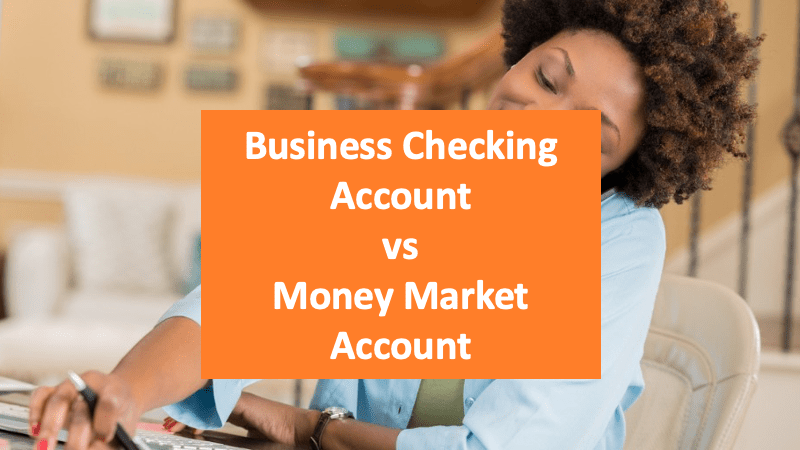Business Checking Account vs Money Market Account for Your Small Business: Understanding the Differences
Table of Contents
Read this definitive guide about the differences between a traditional business checking account vs a money market account for businesses.

As a small business owner, choosing the right financial tools for managing your business’s finances is crucial to ensure smooth operations and financial success. Among the many options available, two common choices are a business checking account and a money market account. In this blog post, we will explore the differences between these two types of accounts and highlight reasons why you might choose a business checking account over a money market account for your small business.
What is a Business Checking Account?
A business checking account is a type of bank account specifically designed for business use. It allows businesses to deposit and withdraw funds, write checks, make electronic payments, and manage day-to-day financial transactions. Business checking accounts typically offer features such as online banking, debit cards, and check-writing privileges to facilitate easy access to funds and streamline business transactions.
What is a Money Market Account?
A money market account, on the other hand, is a type of savings account that earns interest on idle cash balances. Money market accounts are typically offered by banks or other financial institutions and may have certain restrictions on the number of transactions and withdrawals allowed per month. Money market accounts often require a higher minimum balance compared to regular savings accounts, but typically offer higher interest rates in return.
Differences between a Business Checking Account and a Money Market Account
Purpose and Usage
A business checking account is primarily used for day-to-day business transactions, such as depositing and withdrawing funds, writing checks, and making electronic payments. It is meant to support the operational needs of a business, including paying bills, receiving payments from customers, and managing cash flow. On the other hand, a money market account is designed for saving and earning interest on idle cash reserves, rather than for conducting regular business transactions.
Transaction Limits
Business checking accounts typically do not have transaction limits, allowing businesses to make an unlimited number of deposits, withdrawals, and electronic transactions. In contrast, money market accounts may have restrictions on the number of transactions or withdrawals allowed per month, typically limited to six transactions per statement cycle due to federal regulations. Exceeding these limits may result in additional fees or the account being converted to a different type of account.
Interest Rates
Business checking accounts generally do not earn interest or earn minimal interest, as their primary purpose is for transactional purposes. In contrast, money market accounts typically offer higher interest rates compared to business checking accounts, allowing businesses to potentially earn more on their idle cash balances. However, it’s important to note that money market account interest rates are variable and subject to change based on market conditions.
Minimum Balance Requirements
Business checking accounts usually do not have minimum balance requirements, or the requirements are relatively low. On the other hand, money market accounts often require a higher minimum balance to open and maintain the account, which may be a consideration for small businesses with limited cash reserves.
Fees
Business checking accounts may have monthly maintenance fees or transaction fees, depending on the bank and the type of account. Money market accounts may also have fees, such as maintenance fees, excessive withdrawal fees, or minimum balance fees, which can impact the overall return on investment.
Access to Funds
Business checking accounts typically provide easy and unlimited access to funds through check-writing, electronic transactions, and debit cards. In contrast, money market accounts may have limitations on the number of transactions or withdrawals allowed per month, which can impact the ease of accessing funds for day-to-day business needs.
Why Choose a Business Checking Account over a Money Market Account?
Transactional Needs
If your small business has frequent transactional needs, such as writing checks, making electronic payments, and conducting a high volume of transactions, a business checking account may be the more practical choice. Business checking accounts are specifically designed for day-to-day business operations, providing convenient and unlimited access to funds for transactions, payments, and managing cash flow.
Lower Fees
Business checking accounts may have lower fees compared to money market accounts. While business checking accounts may have monthly maintenance fees or transaction fees, they are generally lower compared to money market accounts, which may have additional fees such as maintenance fees, excessive withdrawal fees, or minimum balance fees. For small businesses with tight budgets, minimizing fees can be an important consideration in choosing the right account.
No Transaction Limits
Business checking accounts do not typically have transaction limits, allowing businesses to make unlimited deposits, withdrawals, and electronic transactions. This can be beneficial for businesses with high transaction volumes or frequent need for accessing funds for day-to-day operations. In contrast, money market accounts may have restrictions on the number of transactions or withdrawals allowed per month, which can limit the flexibility and convenience of accessing funds when needed.
Lower Minimum Balance Requirements
Business checking accounts generally do not have minimum balance requirements, or the requirements are relatively low compared to money market accounts. This can be advantageous for small businesses with limited cash reserves, as it allows them to maintain an account without the need for a large amount of funds to meet the minimum balance requirements.
Money market accounts, on the other hand, may require a higher minimum balance to open and maintain the account, which can be a challenge for small businesses with limited cash flow.
Simplified Record-keeping
Business checking accounts are designed for transactional purposes and typically provide detailed records of all transactions, making it easier for businesses to track and manage their expenses, income, and overall financial transactions. This can simplify the record-keeping process and aid in budgeting, tax preparation, and financial reporting.
Money market accounts, on the other hand, may not provide the same level of detailed transaction records, as their primary purpose is for saving and earning interest on idle cash reserves.
Convenience of Check-writing and Electronic Transactions
Business checking accounts often come with check-writing privileges and electronic transaction capabilities, which can be convenient for businesses that need to write checks for payments or make electronic transactions for expenses, payroll, or vendor payments. Money market accounts, on the other hand, may not offer the same level of check-writing or electronic transaction capabilities, as their focus is on saving and earning interest on idle cash balances.
There are many reasons to choose a business checking account over a money market account. Also, how to open a business checking account is a straightforward process when you know what to prepare in advance to open a business checking account.
Why choose a money market account over a business checking account?
As a small business owner, there may be specific reasons why you would choose a money market account over a business checking account. Here are some potential scenarios where a money market account could be a preferred choice:
Higher Interest Rates
Money market accounts typically offer higher interest rates compared to business checking accounts. If your small business has excess cash reserves that you don’t need to use for day-to-day operations, a money market account can allow you to earn interest on those idle funds, potentially helping your business earn additional income.
Short-Term Savings Goals
If your small business has short-term savings goals, such as saving for a specific project or upcoming expense, a money market account can offer a relatively safe and liquid option. With the potential for higher interest rates compared to a business checking account, a money market account can help you grow your savings faster.
Safety of Principal
Money market accounts are typically considered safer than other investment options, such as stocks or bonds, as they are backed by the Federal Deposit Insurance Corporation (FDIC) for banks or the National Credit Union Administration (NCUA) for credit unions. This means that up to a certain limit, usually $250,000 per depositor, per institution, the funds in a money market account are insured against loss due to bank or credit union failure.
Diversification of Funds
As a small business owner, it’s important to diversify your funds and not keep all your business funds in one account or one type of investment. By having a money market account as part of your overall financial strategy, you can diversify your cash reserves and reduce risk by spreading your funds across different types of accounts or investments.
Limited Transaction Needs
If your small business has minimal transaction needs and does not require frequent check-writing or electronic transactions, a money market account may provide sufficient transaction capabilities. Money market accounts often have limitations on the number of transactions or withdrawals allowed per month, which can help you manage your expenses and reduce the temptation to dip into your savings for non-essential transactions.
Relationship with Financial Institution
If you already have a relationship with a financial institution that offers money market accounts and you are satisfied with their services, it may be convenient to open a money market account with them for your small business as well. Having multiple accounts with the same institution can streamline your banking operations and make it easier to manage your business finances.
It’s important to note that while money market accounts can offer advantages such as higher interest rates and safety of principal, they may also come with limitations such as transaction limits, potential fees, and higher minimum balance requirements.
Carefully evaluate the features, fees, and overall convenience of a money market account in relation to your small business’s specific needs and financial goals before making a decision.
Check out this article if you’re a small business owner, sole proprietor, or self-employed and wondering if you need a business checking account: Do I need a separate bank account for my small business?
Conclusion
Both business checking accounts and money market accounts have their advantages and disadvantages, and the right choice depends on the specific needs and priorities of your small business.
While money market accounts can offer higher interest rates and potential returns on idle cash balances, they may have limitations such as transaction limits, higher fees, minimum balance requirements, and less transactional capabilities. On the other hand, business checking accounts provide unlimited transactional capabilities, lower fees, lower minimum balance requirements, simplified record-keeping, and convenience of check-writing and electronic transactions.
For small businesses with frequent transactional needs, lower cash reserves, and a priority on convenient access to funds, a business checking account may be the more suitable option. However, for businesses with excess cash reserves that can be used for savings and investment purposes, a money market account may provide a better opportunity to earn higher interest rates on idle cash balances.
It’s essential to carefully evaluate the features, fees, transaction limits, minimum balance requirements, and overall convenience of both business checking accounts and money market accounts based on the unique needs and priorities of your small business.
Consulting with a financial advisor or a representative from your chosen financial institution can also provide valuable insights and guidance in making the right decision for your business’s financial management. Remember to weigh the pros and cons, consider your business’s financial goals and requirements, and choose the account that best aligns with your business’s financial needs and long term goals.
Was this article helpful?
We are a team of writers and contributors with a passion for creating valuable content for small business owners, self-employed, entrepreneurs, and more.
Feel free to reach out to use as support@falconexpenses.com





